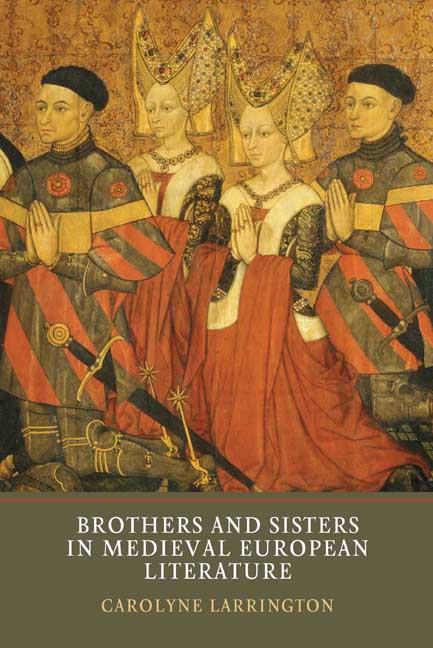Book contents
- Frontmatter
- Dedication
- Contents
- Acknowledgements
- Abbreviations
- Introduction
- 1 The Medieval Sibling in History
- 2 ‘Berr er hverr á bakinu nema sér bróður eigi’: Fraternal Love and Loyalty
- 3 ‘Io v’ho cara quanto sorella si dee avere’: Sisters, and their Brothers
- 4 ‘Næs þæt andæges nið’: Fraternal Hatreds
- 5 ‘Te souviegne de ce que je suis ta seur’: Sisters and Hostility
- 6 ‘The king’s dochter gaes wi child to her brither’: Sibling Incest
- 7 ‘So wil ich dir ce wibe mine swester gebn’: When Siblings Marry
- 8 ‘Trewethes togider that gun plight’: Fictive Siblings
- Conclusion
- Bibliography
- Index
2 - ‘Berr er hverr á bakinu nema sér bróður eigi’: Fraternal Love and Loyalty
Published online by Cambridge University Press: 08 May 2021
- Frontmatter
- Dedication
- Contents
- Acknowledgements
- Abbreviations
- Introduction
- 1 The Medieval Sibling in History
- 2 ‘Berr er hverr á bakinu nema sér bróður eigi’: Fraternal Love and Loyalty
- 3 ‘Io v’ho cara quanto sorella si dee avere’: Sisters, and their Brothers
- 4 ‘Næs þæt andæges nið’: Fraternal Hatreds
- 5 ‘Te souviegne de ce que je suis ta seur’: Sisters and Hostility
- 6 ‘The king’s dochter gaes wi child to her brither’: Sibling Incest
- 7 ‘So wil ich dir ce wibe mine swester gebn’: When Siblings Marry
- 8 ‘Trewethes togider that gun plight’: Fictive Siblings
- Conclusion
- Bibliography
- Index
Summary
Introduction
Holed up on a steep-sided island off Iceland's north coast, the outlaw Grettir and his younger brother Illugi face Grettir's enemies, who have climbed up the island's precipitous cliffs. Already mortally ill, Grettir can scarcely defend himself. When Illugi throws a shield over his brother and fights until he is overcome, Grettir tersely observes, ‘Berr er hverr á bakinu nema sér bróður eigi’ (‘Bare is the back unless one has a brother’). Once Grettir is dead, Illugi refuses to save his own life by swearing to renounce vengeance on his brother's slayer. Defying the cowardly Þorbjõrn hook, Grettir's chief opponent, he chooses to follow his brother in death rather than live with the shame of forswearing vengeance for him.
Grettis saga is probably one of the latest of the Íslendingasögur (sagas of Icelanders) to be composed. Probably late fourteenth century in date, it relates events from the early eleventh century filtered through a later-medieval consciousness of Grettir's historical situation. Grettir's ancestors were relative late-comers to Iceland, and Grettir himself is incapable of settling to the life of a farmer as his older brother Atli does. He pursues a no-longer-viable career as a Viking: a life of raiding and fighting anachronistic within his northern Icelandic farming community and which ends in his outlawry. Like many other brothers, Grettir and Atli preserve their warm fraternal relationship through clear differentiation: one fights, one farms, and Grettir displays no interest in inheriting land from his father. Illugi's fraternality is differently imagined. The boy is profoundly attached to the brother he scarcely knows; as a much younger sibling he idealizes, even hero-worships, his habitually absent brother. Although Grettir has strikingly fractious relationships with his father and with the young men of his age-cohort in the district, he remains emotionally close to both his brothers, avenging the death of Atli, and sharing a small hut for several years with Illugi without evident strain.
Grettir's remark about the exposed existence of a man with no brother is proverbial; it occurs in sibling and non-sibling contexts elsewhere in Germanic literature. In Saxo Grammaticus's account (c. 1200) of the slack young Danish king Frothi III, it is deployed when Ericus the Eloquent and his faithful halfbrother Roller enter the king's hall.
- Type
- Chapter
- Information
- Brothers and Sisters in Medieval European Literature , pp. 46 - 75Publisher: Boydell & BrewerPrint publication year: 2015



